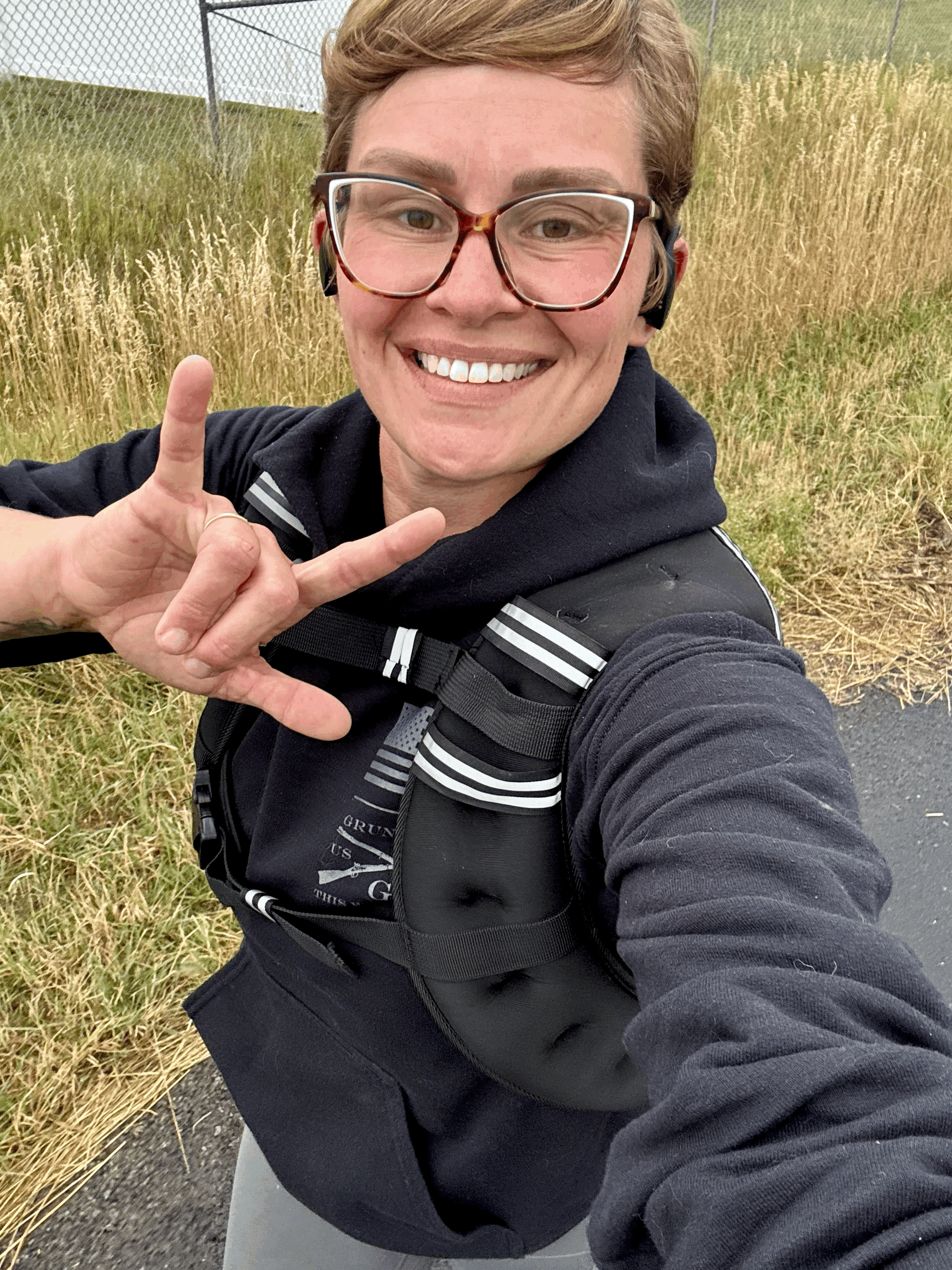Grieving Myself: Living with Dementia as a Young Adult
Woman with brown hair and glasses smiling while walking in a black weighted vest and signing “love” in ASL, symbolizing resilience and self-compassion
By Frankie
Disabled Air Force Veteran | Chronic Illness Advocate | Medical Nerd
I’ve been really struggling lately — mentally and physically. My fatigue is worse, my pain is worse, my memory and focus are worse, and even my hearing and ability to process sounds is deteriorating. I’m completely burnt out, and I felt like people needed to hear the real thoughts that constantly plague my mind. I think I’m going into Autistic burnout.
As an Autistic person, I have delayed processing, which means when something happens — happy, sad, or traumatic — I don’t process it at the time. Sometimes it hits minutes later, hours later, days later… or even years later.
The Diagnosis That Changed Everything
I was diagnosed with dementia at 26, but by then, my health had been declining for a few years and I had gone from leading in a high pressure medical environment to being fired for my limitations working as a clinical receptionist... Unfortunately the diagnosis itself fell by the wayside amid the chaos because I simply didn’t have the capacity to fight for it at the time. I was too scared, too tired, too sick.
I lost the version of me who could work, thrive in my special area of interest — medicine. I was sharp, organized, confident. Now, I’m a stay-at-home mom, homeschooling my daughter, and focusing on therapy and medical appointments. I have new purpose — but the grief is still real. Sometimes I wish people understood that losing your hearing or losing your ability to function cognitively feels as if someone has just amputated your arm. I sometimes wish there was a visible sign or indication to prove that yes, I am disabled, but would be insane. I shouldn’t have to prove anything. People should just be more capable of compassion, understanding and empathy. Full stop. Understand us. Accommodate us. Accept US. Just as we accept everyone else.
Coping with Hearing Loss & Cognitive Decline
Along with dementia, I lost my hearing and my ability to process sounds like everyone else. I have to wear hearing aids, and despite using calendars and reminders obsessively, I sometimes show up on the wrong day, at the wrong time, or late.
It’s not just embarrassing — it’s guilt-inducing, because I know my struggles inconvenience others. I’ve always been dependable and punctual, but now I can’t always be the person I used to be.
Phone conversations or any conversation really are extremely difficult because not only do I have hearing loss in both ears so it’s hard to hear on the phone or in a crowded room, I also have auditory processing disorder and memory issues so written communication is honestly the best way to communicate with me if you want me to remember the message you’re trying to get across.
Even on “good” days, I am still sick, still disabled, and still struggling to function in ways most people take for granted.
Anger, Research, and the Medical Response
After my diagnosis, no one cared to investigate the cause of my cognitive changes and hearing loss. I was 26, and no one thought that was alarming so I did what I always do: I hit the research hard.
What I found shocked me: Gamma Knife radiation can cause major neurocognitive disorder (dementia) and hearing loss due to tissue damage. Yet, the medical community refuses to admit it or even investigate it. If I had a confirmed cause, I could accept myself the way I do with my autism. I could explain myself and stop people from assuming, “You just have a lot going on.” This is not the same.
Grieving Myself
I feel like I’m grieving myself — the person I thought I would be. I look back on my military career as a medic and conversations with the doctors I worked with. One of them said, “Sgt, why haven’t you gone to medical school? You’d be an amazing physician.” That memory rips my heart out. I will never be who I wanted to be.
Even as I’m learning to embrace the new me, I am still in deep mourning — a grief so profound I can’t even put it into words. The person I was, the life I imagined, the abilities I had… they’re gone, and some days that loss feels unbearable. It feels like part of me died.
Living with Invisible Disability
What makes this journey almost intolerable is the dismissal from people who say, “Well, you look and sound great!.” While this is not ill intended, it’s harmful because my struggle is invisible. They see a smile and assume I’m fine, but this has been life altering for me.
But I’m still here. I’m still fighting. I’m still showing up — even if no one sees the battles I fight inside. Chronic illness and invisible disability are lonely, but I refuse to stop trying.
Finding Purpose & Resilience
I’m learning, slowly and painfully, to embrace this new version of me. I may not be the person I once was or that I planned on being but I’m still capable of love, resilience, and showing up in my own way. I have a lot to give to the world.
If my story resonates with you — whether you’re navigating chronic illness, brain injury, or invisible disability — you are not alone.
If you don’t live with any of this and are just here to learn then I encourage you to follow me on YouTube, Facebook and Instagram to learn more!
And please, reach out! I love swapping stories and bouncing ideas off of each other to help advocate for our health.
And as always, stay resilient ❤️🩹
